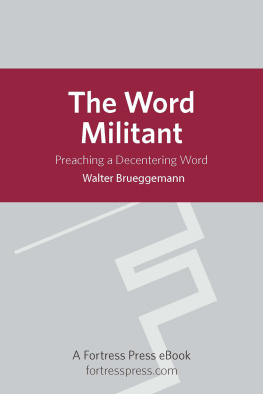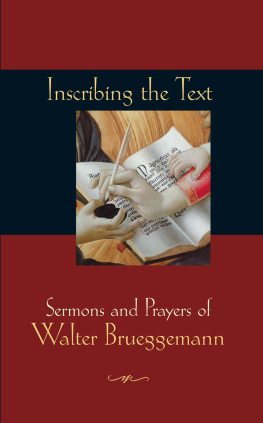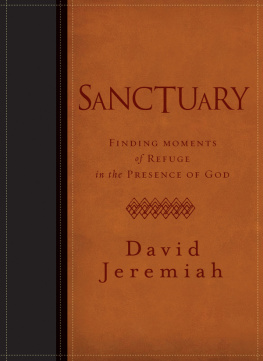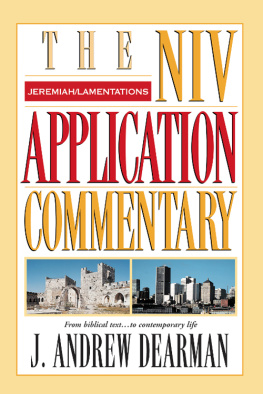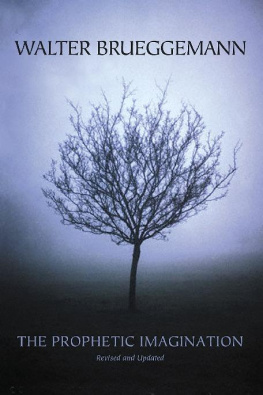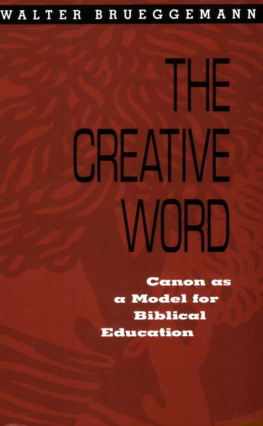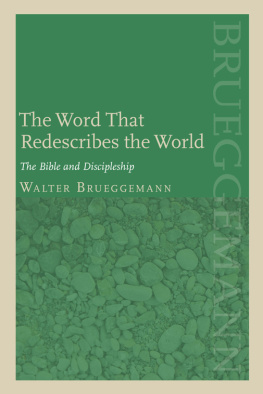
Like Fire in the Bones
Like Fire in the Bones
Listening for the Prophetic Word in Jeremiah
WALTER BRUEGGEMANN
Edited by Patrick D. Miller
FORTRESS PRESS
Minneapolis
LIKE FIRE IN THE BONES
Listening for the Prophetic Word in Jeremiah
First Fortress Press paperback edition 2011
Copyright 2006 Fortress Press. All rights reserved. Except for brief quotations in critical articles or reviews, no part of this book may be reproduced in any manner without prior written permission from the publisher. Visit http://www.augsburgfortress.org/copyrights/ or write to Permissions, Augsburg Fortress, Box 1209, Minneapolis, MN 55440.
Scripture quotations are from the New Revised Standard Version Bible, copyright 1989 by the Division of Christian Education of the National Council of the Churches of Christ in the USA, and are used by permission.
Cover design: Kevin van der Leek Design Inc.
Cover photo: Trinette Reed/Photodisc/Getty Images. Used by permission.
Interior design: Beth Wright, Trio Bookworks
eISBN 978-1-4514-1967-2
ISBN 978-0-8006-9828-7
The Library of Congress cataloged the hardcover edition as follows:
Library of Congress Cataloging-in-Publication Data
Brueggemann, Walter.
Like fire in the bones : listening for the prophetic word in Jeremiah / Walter Brueggemann ; edited by Patrick D. Miller.
p. cm.
Includes bibliographical references and index.
ISBN: 978-0-8006-3561-9 (alk. paper)
1. Bible. O.T. JeremiahCriticism, interpretation, etc. I. Miller, Patrick D. II. Title.
BS1525.52.B78 2006
224.206dc22
2006010165
Contents
To the Memory of Warren R. Mehl
T here are few books of the Old Testament about which Walter Brueggemann has not written in some depth. The breadth of his work matches the prolific output of scholarly, relevant, and helpful interpretation of scripture in book, essay, sermon, and prayer. It would be difficult, therefore, to identify any one area or book as a primary sphere or subject of his interpretive activity. Nevertheless, I am bold to suggest that if there is any book that he has probed more deeply and tellingly than all the others, devoting his energies to both commentary and essay, writing for both the academy and the church, it is the book of Jeremiah. His commentary on this prophetic book, A Commentary on Jeremiah: Exile and Homecoming, may well be the best of all his commentaries. At least, as someone who has also written a commentary on the book of Jeremiah, I can testify that no single work has provided more insight into the text or said what needed to be said in clear and helpful ways than Brueggemanns commentary, despite a spate of fine Jeremiah commentaries over the last twenty-five years.
What is there about this book that commands Brueggemanns attention and brings out so much astute and meaningful interpretation? If one infers from his many writings about this prophet and the book attributed to him, several possibilities arise. One is the degree to which the book gives a searing portrayal of a prophet under the constraints of both his calling and his circumstances. Surely there is no more extended depiction of prophetic existence and its precariousness than the prophet Jeremiah. At one point, after giving a summary statement of what it means to be a prophet, Brueggemann says succinctly: Jeremiah is the most extreme case. Throughout the essays that follow here, one encounters the prophet in all his agony, doubt, and despair, and also in his relentless commitment to the calling he sought to avoid but could not. The reader will discern Brueggemann getting into Jeremiahs skin and helping us do the same. As the book makes clear, the word of the Lord that comes through this prophet is intricately linked to his own experience. Brueggemanns empathetic interpretation is such that often one cannot sharply separate the voice of the prophet and the voice of his interpreter. Jeremiah has always been a barrier against the purveyors of cheap grace, something Brueggemann abhors as much as did Bonhoeffer. He is as aware as Jeremiah that there are many who cry Peace! when all around there is war and suffering and death.
Brueggemanns continuing fascination with this prophet rests also in the fact that Jeremiah prophesied in a critical time in the history of Israel. As he puts it in one of his essays, Jeremiah lived at a time of incredible headlines. While there is much debate over when Jeremiahs career started, there is no question that his prophetic work ranged from a time of grandeur and power in the Judean state through its downfall and into the time of exile. Jeremiahs times were as momentous and formative for Israels story as any period in its history. So this prophets message is to be heard against the background of large political, social, and economic upheavals. However one decides about the redaction of the book and the assignment of any particular oracle to Jeremiah, his words of judgment and hope as they are presented in the book are clearly reflective of the circumstances in which he lived and prophesied. He moves from powerful oracles condemning a complacent elitedeclaring the Lords intention to bring them downto words of encouragement to those who have experienced Gods judgment that they learn to live in their place and time of exile and to live in hope that God will restore their fortunes.
No prophet has conveyed more sharply the pathos of the prophetic calling to speak strong words to unwilling listeners and endure the consequences. His oracles and prayers, however, are also a vivid testimony to the pathos of the Lord who called him into his difficult ministry. Along with the powerful words of judgment against kings and other leaders who betrayed the covenantal demands of faithfulness are the tears of God over the peoples failure to live as Gods people, committed to ways of justice and righteousness, the care of the weak and the fear of the Lord. From his monumental Theology of the Old Testament to the present collection of essays, written over a long period of time, Brueggemann never lets us forget the true subject, the center and meaning of all of scripture, who never let Jeremiah off the hook even in his most desperate moments. The prophets were messengersin their lives, their words, their actions. So is Brueggemann as he invites us to hear afresh the ancient word so agonistically announced by this prophet from Anathoth, not in order to understand the prophet better but to hear and respond to the one who spoke through him.
The reader never loses the author in these essays. Brueggemann is unabashed about overlaying his careful reading of texts with powerful claims about their significance for our lives. He is unable to speak about them simply as ancient words. Indeed, while he seeks to uncover the resonance of the texts with their times and circumstances, that is finally only in order to convey the powerful and often abrasive impact of these texts on our times and circumstances. He never quits preaching and is always meddling. That was Jeremiahs way. So what choice does the interpreter have? I think Brueggemann is right. The only thing that matters about the prophetic word is its relevance. Those who keep on reading will, therefore, be disturbed, moved, encouraged, and challenged. I am not sure Brueggemann has any other purpose in writing about this disturbing and challenging man of God.
Next page


